High Court of Australia: Civil Liberties Action Group Case Analysis
VerifiedAdded on 2020/04/21
|6
|1865
|76
Report
AI Summary
This report analyzes the case of the Australian Civil Liberties Action Group versus the Commonwealth of Australia, focusing on the Countering Terrorist Activities Act (CTA) of 2017. The report examines the constitutionality of key provisions within the CTA, particularly Sections 1 and 2, which address the acquisition of the Pond University Library by the Australian Anti-Terrorism Authority and restrictions on dual citizens convicted of terrorist activities. The analysis references relevant case law, including Koroitamana v Commonwealth of Australia, Pochi v Macphee, Singh v Commonwealth of Australia, Chu Kheng Lim v Minister for Immigration, Thomas v Mowbray, and McCloy v New South Wales, to support arguments concerning violations of Section 51 (xxxi), Section 51(vi), and Section 51(xix) of the Australian Constitution, as well as the implied freedom of political communication and the right to vote. The report highlights the limitations of the Commonwealth's power in relation to dual citizens and argues that Section 2 of the CTA is an overreach of governmental authority, infringing upon fundamental rights. The report concludes by asserting that the provisions restricting dual citizens' rights are not aligned with the general understanding of the world and therefore should be deemed invalid.
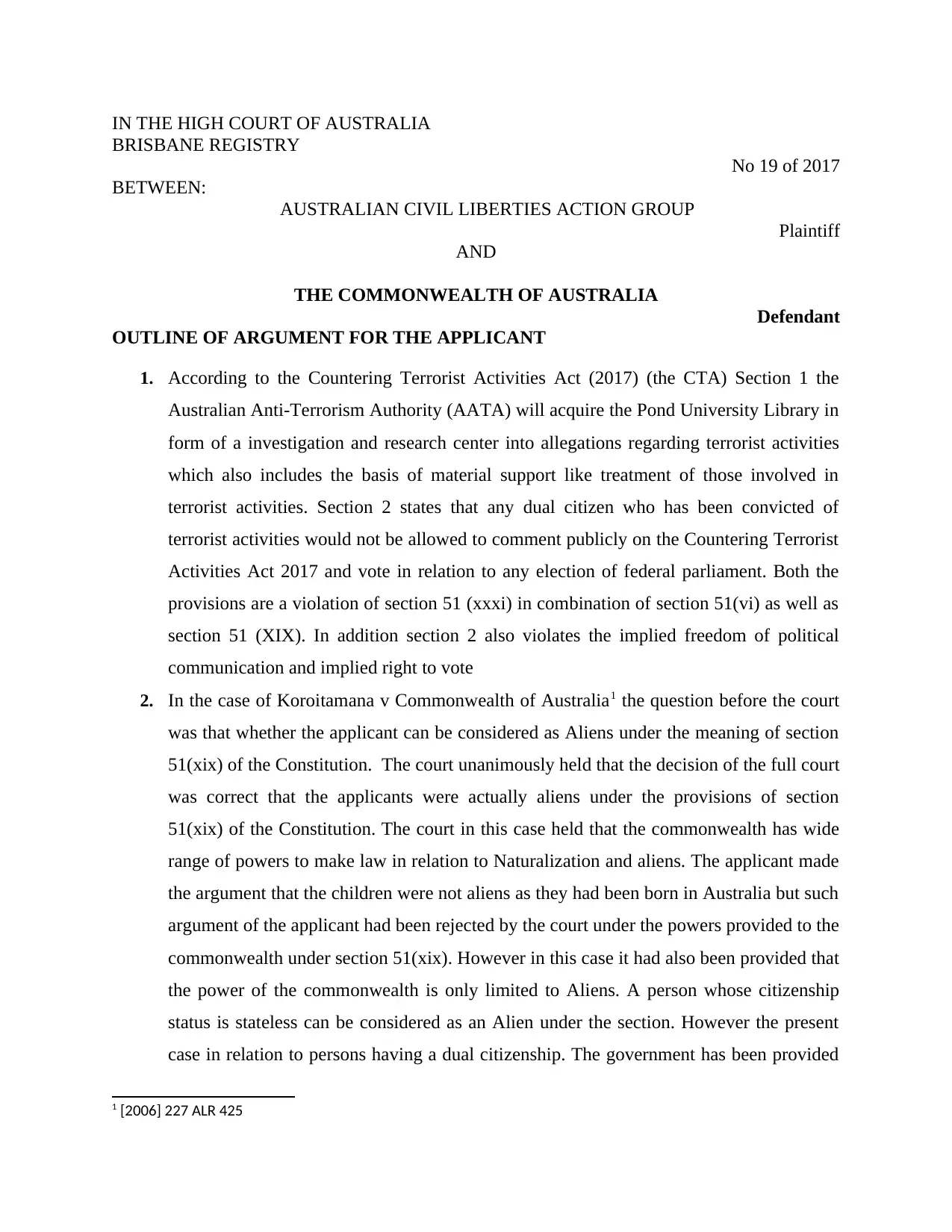
IN THE HIGH COURT OF AUSTRALIA
BRISBANE REGISTRY
No 19 of 2017
BETWEEN:
AUSTRALIAN CIVIL LIBERTIES ACTION GROUP
Plaintiff
AND
THE COMMONWEALTH OF AUSTRALIA
Defendant
OUTLINE OF ARGUMENT FOR THE APPLICANT
1. According to the Countering Terrorist Activities Act (2017) (the CTA) Section 1 the
Australian Anti-Terrorism Authority (AATA) will acquire the Pond University Library in
form of a investigation and research center into allegations regarding terrorist activities
which also includes the basis of material support like treatment of those involved in
terrorist activities. Section 2 states that any dual citizen who has been convicted of
terrorist activities would not be allowed to comment publicly on the Countering Terrorist
Activities Act 2017 and vote in relation to any election of federal parliament. Both the
provisions are a violation of section 51 (xxxi) in combination of section 51(vi) as well as
section 51 (XIX). In addition section 2 also violates the implied freedom of political
communication and implied right to vote
2. In the case of Koroitamana v Commonwealth of Australia1 the question before the court
was that whether the applicant can be considered as Aliens under the meaning of section
51(xix) of the Constitution. The court unanimously held that the decision of the full court
was correct that the applicants were actually aliens under the provisions of section
51(xix) of the Constitution. The court in this case held that the commonwealth has wide
range of powers to make law in relation to Naturalization and aliens. The applicant made
the argument that the children were not aliens as they had been born in Australia but such
argument of the applicant had been rejected by the court under the powers provided to the
commonwealth under section 51(xix). However in this case it had also been provided that
the power of the commonwealth is only limited to Aliens. A person whose citizenship
status is stateless can be considered as an Alien under the section. However the present
case in relation to persons having a dual citizenship. The government has been provided
1 [2006] 227 ALR 425
BRISBANE REGISTRY
No 19 of 2017
BETWEEN:
AUSTRALIAN CIVIL LIBERTIES ACTION GROUP
Plaintiff
AND
THE COMMONWEALTH OF AUSTRALIA
Defendant
OUTLINE OF ARGUMENT FOR THE APPLICANT
1. According to the Countering Terrorist Activities Act (2017) (the CTA) Section 1 the
Australian Anti-Terrorism Authority (AATA) will acquire the Pond University Library in
form of a investigation and research center into allegations regarding terrorist activities
which also includes the basis of material support like treatment of those involved in
terrorist activities. Section 2 states that any dual citizen who has been convicted of
terrorist activities would not be allowed to comment publicly on the Countering Terrorist
Activities Act 2017 and vote in relation to any election of federal parliament. Both the
provisions are a violation of section 51 (xxxi) in combination of section 51(vi) as well as
section 51 (XIX). In addition section 2 also violates the implied freedom of political
communication and implied right to vote
2. In the case of Koroitamana v Commonwealth of Australia1 the question before the court
was that whether the applicant can be considered as Aliens under the meaning of section
51(xix) of the Constitution. The court unanimously held that the decision of the full court
was correct that the applicants were actually aliens under the provisions of section
51(xix) of the Constitution. The court in this case held that the commonwealth has wide
range of powers to make law in relation to Naturalization and aliens. The applicant made
the argument that the children were not aliens as they had been born in Australia but such
argument of the applicant had been rejected by the court under the powers provided to the
commonwealth under section 51(xix). However in this case it had also been provided that
the power of the commonwealth is only limited to Aliens. A person whose citizenship
status is stateless can be considered as an Alien under the section. However the present
case in relation to persons having a dual citizenship. The government has been provided
1 [2006] 227 ALR 425
Paraphrase This Document
Need a fresh take? Get an instant paraphrase of this document with our AI Paraphraser
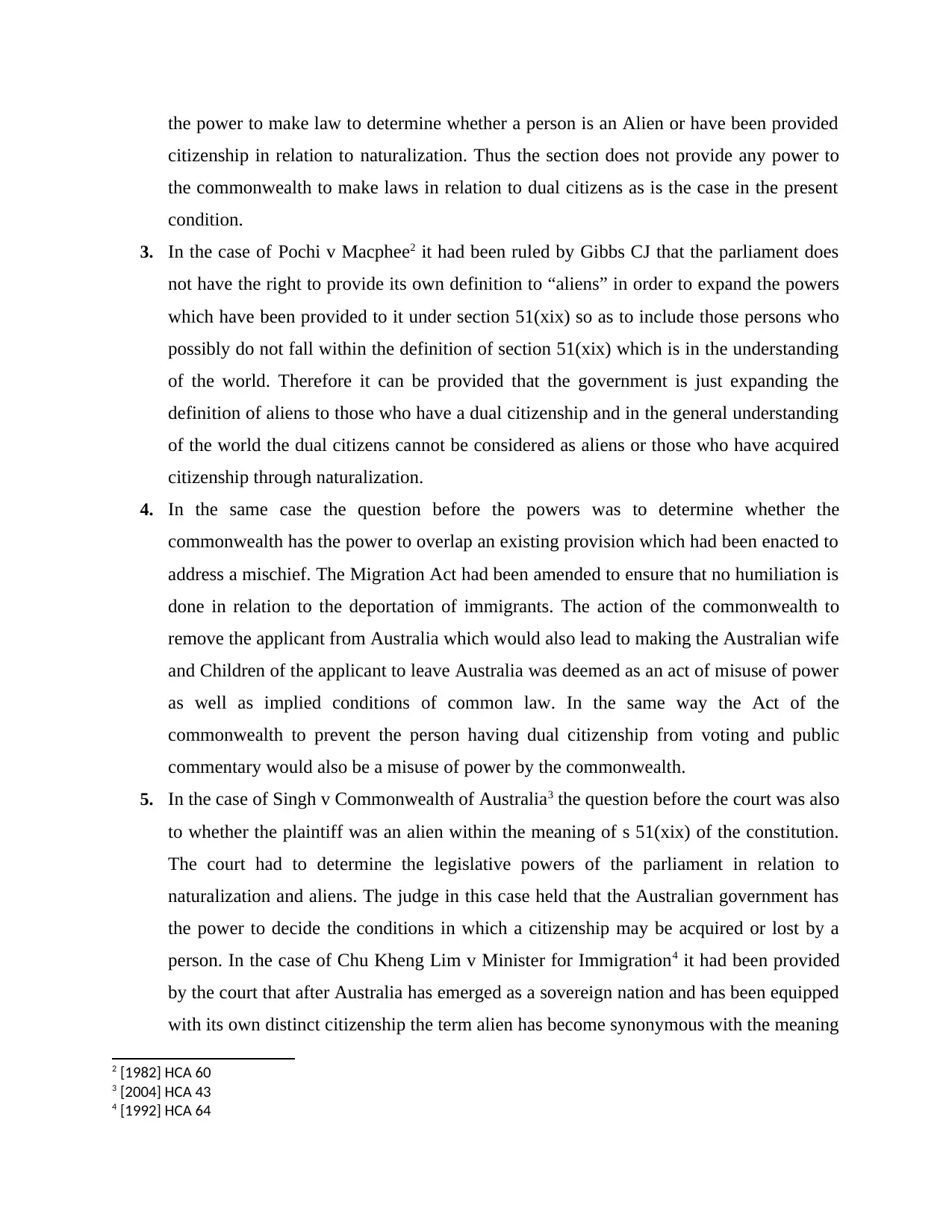
the power to make law to determine whether a person is an Alien or have been provided
citizenship in relation to naturalization. Thus the section does not provide any power to
the commonwealth to make laws in relation to dual citizens as is the case in the present
condition.
3. In the case of Pochi v Macphee2 it had been ruled by Gibbs CJ that the parliament does
not have the right to provide its own definition to “aliens” in order to expand the powers
which have been provided to it under section 51(xix) so as to include those persons who
possibly do not fall within the definition of section 51(xix) which is in the understanding
of the world. Therefore it can be provided that the government is just expanding the
definition of aliens to those who have a dual citizenship and in the general understanding
of the world the dual citizens cannot be considered as aliens or those who have acquired
citizenship through naturalization.
4. In the same case the question before the powers was to determine whether the
commonwealth has the power to overlap an existing provision which had been enacted to
address a mischief. The Migration Act had been amended to ensure that no humiliation is
done in relation to the deportation of immigrants. The action of the commonwealth to
remove the applicant from Australia which would also lead to making the Australian wife
and Children of the applicant to leave Australia was deemed as an act of misuse of power
as well as implied conditions of common law. In the same way the Act of the
commonwealth to prevent the person having dual citizenship from voting and public
commentary would also be a misuse of power by the commonwealth.
5. In the case of Singh v Commonwealth of Australia3 the question before the court was also
to whether the plaintiff was an alien within the meaning of s 51(xix) of the constitution.
The court had to determine the legislative powers of the parliament in relation to
naturalization and aliens. The judge in this case held that the Australian government has
the power to decide the conditions in which a citizenship may be acquired or lost by a
person. In the case of Chu Kheng Lim v Minister for Immigration4 it had been provided
by the court that after Australia has emerged as a sovereign nation and has been equipped
with its own distinct citizenship the term alien has become synonymous with the meaning
2 [1982] HCA 60
3 [2004] HCA 43
4 [1992] HCA 64
citizenship in relation to naturalization. Thus the section does not provide any power to
the commonwealth to make laws in relation to dual citizens as is the case in the present
condition.
3. In the case of Pochi v Macphee2 it had been ruled by Gibbs CJ that the parliament does
not have the right to provide its own definition to “aliens” in order to expand the powers
which have been provided to it under section 51(xix) so as to include those persons who
possibly do not fall within the definition of section 51(xix) which is in the understanding
of the world. Therefore it can be provided that the government is just expanding the
definition of aliens to those who have a dual citizenship and in the general understanding
of the world the dual citizens cannot be considered as aliens or those who have acquired
citizenship through naturalization.
4. In the same case the question before the powers was to determine whether the
commonwealth has the power to overlap an existing provision which had been enacted to
address a mischief. The Migration Act had been amended to ensure that no humiliation is
done in relation to the deportation of immigrants. The action of the commonwealth to
remove the applicant from Australia which would also lead to making the Australian wife
and Children of the applicant to leave Australia was deemed as an act of misuse of power
as well as implied conditions of common law. In the same way the Act of the
commonwealth to prevent the person having dual citizenship from voting and public
commentary would also be a misuse of power by the commonwealth.
5. In the case of Singh v Commonwealth of Australia3 the question before the court was also
to whether the plaintiff was an alien within the meaning of s 51(xix) of the constitution.
The court had to determine the legislative powers of the parliament in relation to
naturalization and aliens. The judge in this case held that the Australian government has
the power to decide the conditions in which a citizenship may be acquired or lost by a
person. In the case of Chu Kheng Lim v Minister for Immigration4 it had been provided
by the court that after Australia has emerged as a sovereign nation and has been equipped
with its own distinct citizenship the term alien has become synonymous with the meaning
2 [1982] HCA 60
3 [2004] HCA 43
4 [1992] HCA 64
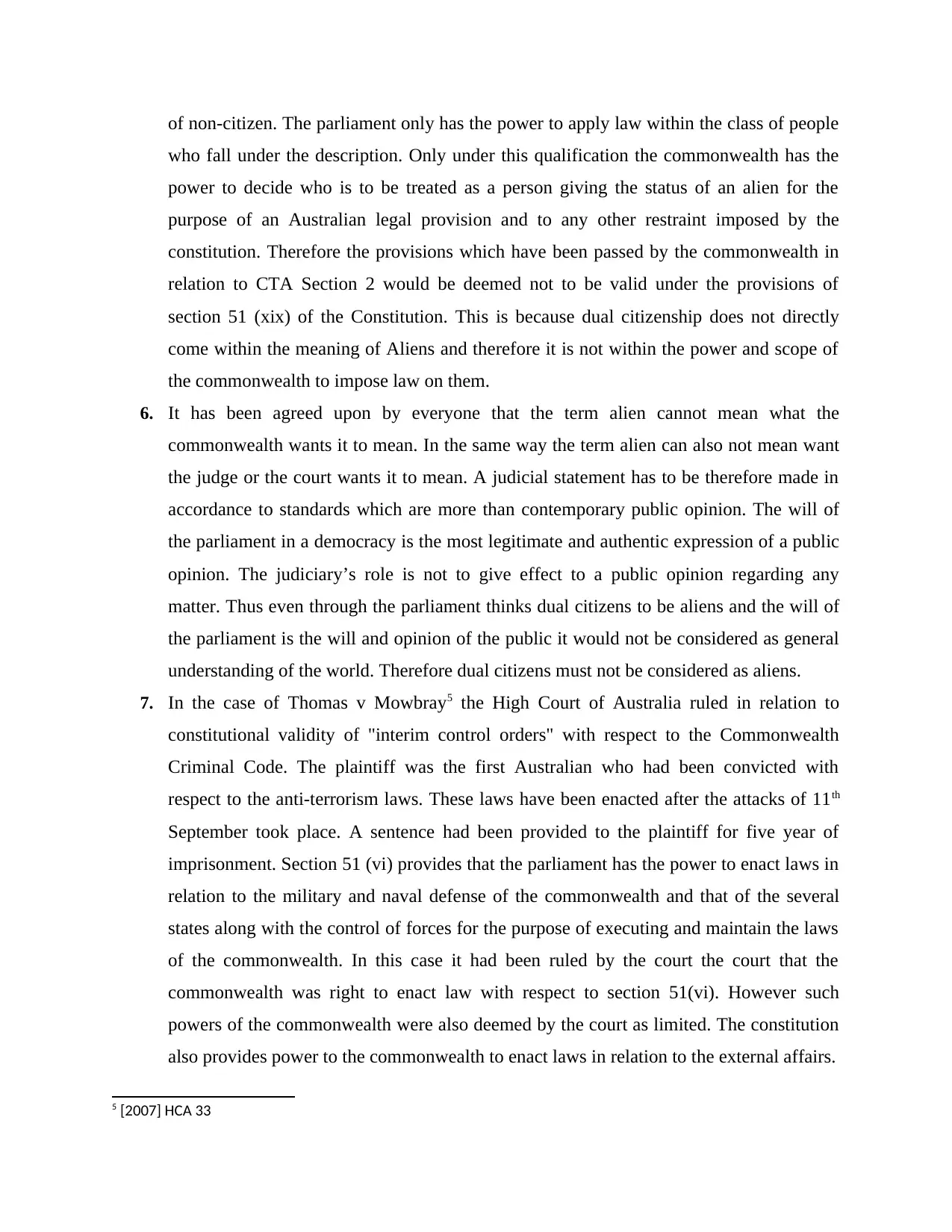
of non-citizen. The parliament only has the power to apply law within the class of people
who fall under the description. Only under this qualification the commonwealth has the
power to decide who is to be treated as a person giving the status of an alien for the
purpose of an Australian legal provision and to any other restraint imposed by the
constitution. Therefore the provisions which have been passed by the commonwealth in
relation to CTA Section 2 would be deemed not to be valid under the provisions of
section 51 (xix) of the Constitution. This is because dual citizenship does not directly
come within the meaning of Aliens and therefore it is not within the power and scope of
the commonwealth to impose law on them.
6. It has been agreed upon by everyone that the term alien cannot mean what the
commonwealth wants it to mean. In the same way the term alien can also not mean want
the judge or the court wants it to mean. A judicial statement has to be therefore made in
accordance to standards which are more than contemporary public opinion. The will of
the parliament in a democracy is the most legitimate and authentic expression of a public
opinion. The judiciary’s role is not to give effect to a public opinion regarding any
matter. Thus even through the parliament thinks dual citizens to be aliens and the will of
the parliament is the will and opinion of the public it would not be considered as general
understanding of the world. Therefore dual citizens must not be considered as aliens.
7. In the case of Thomas v Mowbray5 the High Court of Australia ruled in relation to
constitutional validity of "interim control orders" with respect to the Commonwealth
Criminal Code. The plaintiff was the first Australian who had been convicted with
respect to the anti-terrorism laws. These laws have been enacted after the attacks of 11th
September took place. A sentence had been provided to the plaintiff for five year of
imprisonment. Section 51 (vi) provides that the parliament has the power to enact laws in
relation to the military and naval defense of the commonwealth and that of the several
states along with the control of forces for the purpose of executing and maintain the laws
of the commonwealth. In this case it had been ruled by the court the court that the
commonwealth was right to enact law with respect to section 51(vi). However such
powers of the commonwealth were also deemed by the court as limited. The constitution
also provides power to the commonwealth to enact laws in relation to the external affairs.
5 [2007] HCA 33
who fall under the description. Only under this qualification the commonwealth has the
power to decide who is to be treated as a person giving the status of an alien for the
purpose of an Australian legal provision and to any other restraint imposed by the
constitution. Therefore the provisions which have been passed by the commonwealth in
relation to CTA Section 2 would be deemed not to be valid under the provisions of
section 51 (xix) of the Constitution. This is because dual citizenship does not directly
come within the meaning of Aliens and therefore it is not within the power and scope of
the commonwealth to impose law on them.
6. It has been agreed upon by everyone that the term alien cannot mean what the
commonwealth wants it to mean. In the same way the term alien can also not mean want
the judge or the court wants it to mean. A judicial statement has to be therefore made in
accordance to standards which are more than contemporary public opinion. The will of
the parliament in a democracy is the most legitimate and authentic expression of a public
opinion. The judiciary’s role is not to give effect to a public opinion regarding any
matter. Thus even through the parliament thinks dual citizens to be aliens and the will of
the parliament is the will and opinion of the public it would not be considered as general
understanding of the world. Therefore dual citizens must not be considered as aliens.
7. In the case of Thomas v Mowbray5 the High Court of Australia ruled in relation to
constitutional validity of "interim control orders" with respect to the Commonwealth
Criminal Code. The plaintiff was the first Australian who had been convicted with
respect to the anti-terrorism laws. These laws have been enacted after the attacks of 11th
September took place. A sentence had been provided to the plaintiff for five year of
imprisonment. Section 51 (vi) provides that the parliament has the power to enact laws in
relation to the military and naval defense of the commonwealth and that of the several
states along with the control of forces for the purpose of executing and maintain the laws
of the commonwealth. In this case it had been ruled by the court the court that the
commonwealth was right to enact law with respect to section 51(vi). However such
powers of the commonwealth were also deemed by the court as limited. The constitution
also provides power to the commonwealth to enact laws in relation to the external affairs.
5 [2007] HCA 33
⊘ This is a preview!⊘
Do you want full access?
Subscribe today to unlock all pages.

Trusted by 1+ million students worldwide
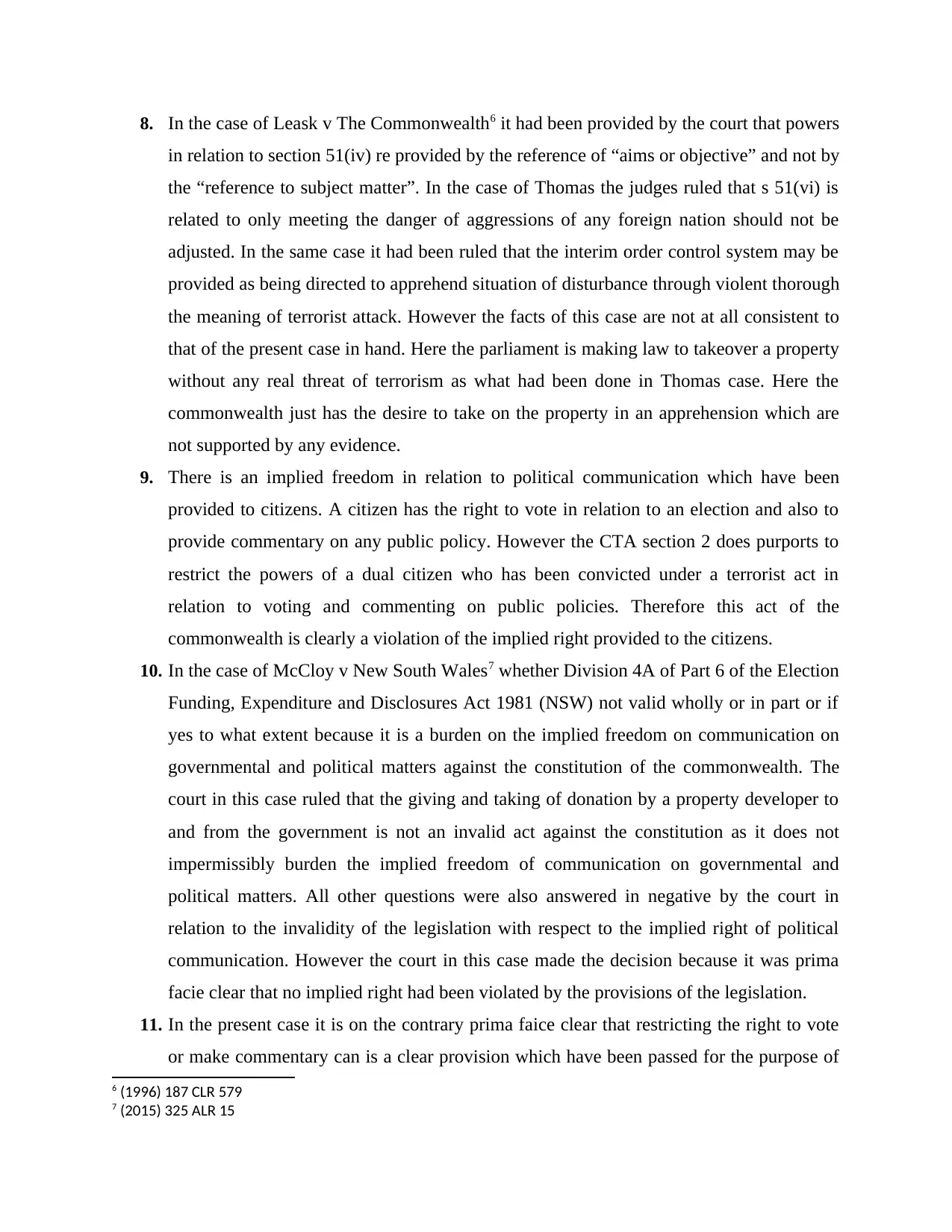
8. In the case of Leask v The Commonwealth6 it had been provided by the court that powers
in relation to section 51(iv) re provided by the reference of “aims or objective” and not by
the “reference to subject matter”. In the case of Thomas the judges ruled that s 51(vi) is
related to only meeting the danger of aggressions of any foreign nation should not be
adjusted. In the same case it had been ruled that the interim order control system may be
provided as being directed to apprehend situation of disturbance through violent thorough
the meaning of terrorist attack. However the facts of this case are not at all consistent to
that of the present case in hand. Here the parliament is making law to takeover a property
without any real threat of terrorism as what had been done in Thomas case. Here the
commonwealth just has the desire to take on the property in an apprehension which are
not supported by any evidence.
9. There is an implied freedom in relation to political communication which have been
provided to citizens. A citizen has the right to vote in relation to an election and also to
provide commentary on any public policy. However the CTA section 2 does purports to
restrict the powers of a dual citizen who has been convicted under a terrorist act in
relation to voting and commenting on public policies. Therefore this act of the
commonwealth is clearly a violation of the implied right provided to the citizens.
10. In the case of McCloy v New South Wales7 whether Division 4A of Part 6 of the Election
Funding, Expenditure and Disclosures Act 1981 (NSW) not valid wholly or in part or if
yes to what extent because it is a burden on the implied freedom on communication on
governmental and political matters against the constitution of the commonwealth. The
court in this case ruled that the giving and taking of donation by a property developer to
and from the government is not an invalid act against the constitution as it does not
impermissibly burden the implied freedom of communication on governmental and
political matters. All other questions were also answered in negative by the court in
relation to the invalidity of the legislation with respect to the implied right of political
communication. However the court in this case made the decision because it was prima
facie clear that no implied right had been violated by the provisions of the legislation.
11. In the present case it is on the contrary prima faice clear that restricting the right to vote
or make commentary can is a clear provision which have been passed for the purpose of
6 (1996) 187 CLR 579
7 (2015) 325 ALR 15
in relation to section 51(iv) re provided by the reference of “aims or objective” and not by
the “reference to subject matter”. In the case of Thomas the judges ruled that s 51(vi) is
related to only meeting the danger of aggressions of any foreign nation should not be
adjusted. In the same case it had been ruled that the interim order control system may be
provided as being directed to apprehend situation of disturbance through violent thorough
the meaning of terrorist attack. However the facts of this case are not at all consistent to
that of the present case in hand. Here the parliament is making law to takeover a property
without any real threat of terrorism as what had been done in Thomas case. Here the
commonwealth just has the desire to take on the property in an apprehension which are
not supported by any evidence.
9. There is an implied freedom in relation to political communication which have been
provided to citizens. A citizen has the right to vote in relation to an election and also to
provide commentary on any public policy. However the CTA section 2 does purports to
restrict the powers of a dual citizen who has been convicted under a terrorist act in
relation to voting and commenting on public policies. Therefore this act of the
commonwealth is clearly a violation of the implied right provided to the citizens.
10. In the case of McCloy v New South Wales7 whether Division 4A of Part 6 of the Election
Funding, Expenditure and Disclosures Act 1981 (NSW) not valid wholly or in part or if
yes to what extent because it is a burden on the implied freedom on communication on
governmental and political matters against the constitution of the commonwealth. The
court in this case ruled that the giving and taking of donation by a property developer to
and from the government is not an invalid act against the constitution as it does not
impermissibly burden the implied freedom of communication on governmental and
political matters. All other questions were also answered in negative by the court in
relation to the invalidity of the legislation with respect to the implied right of political
communication. However the court in this case made the decision because it was prima
facie clear that no implied right had been violated by the provisions of the legislation.
11. In the present case it is on the contrary prima faice clear that restricting the right to vote
or make commentary can is a clear provision which have been passed for the purpose of
6 (1996) 187 CLR 579
7 (2015) 325 ALR 15
Paraphrase This Document
Need a fresh take? Get an instant paraphrase of this document with our AI Paraphraser
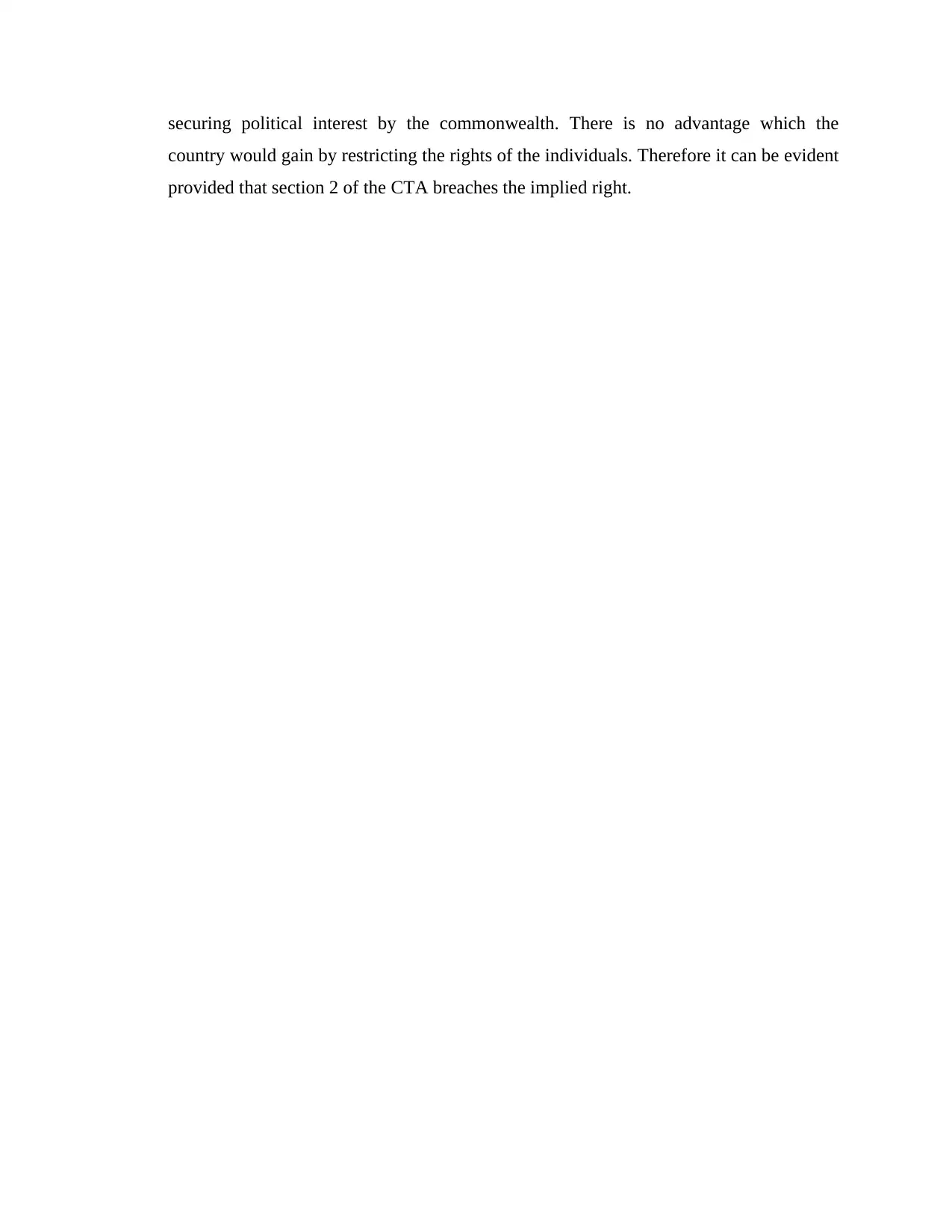
securing political interest by the commonwealth. There is no advantage which the
country would gain by restricting the rights of the individuals. Therefore it can be evident
provided that section 2 of the CTA breaches the implied right.
country would gain by restricting the rights of the individuals. Therefore it can be evident
provided that section 2 of the CTA breaches the implied right.
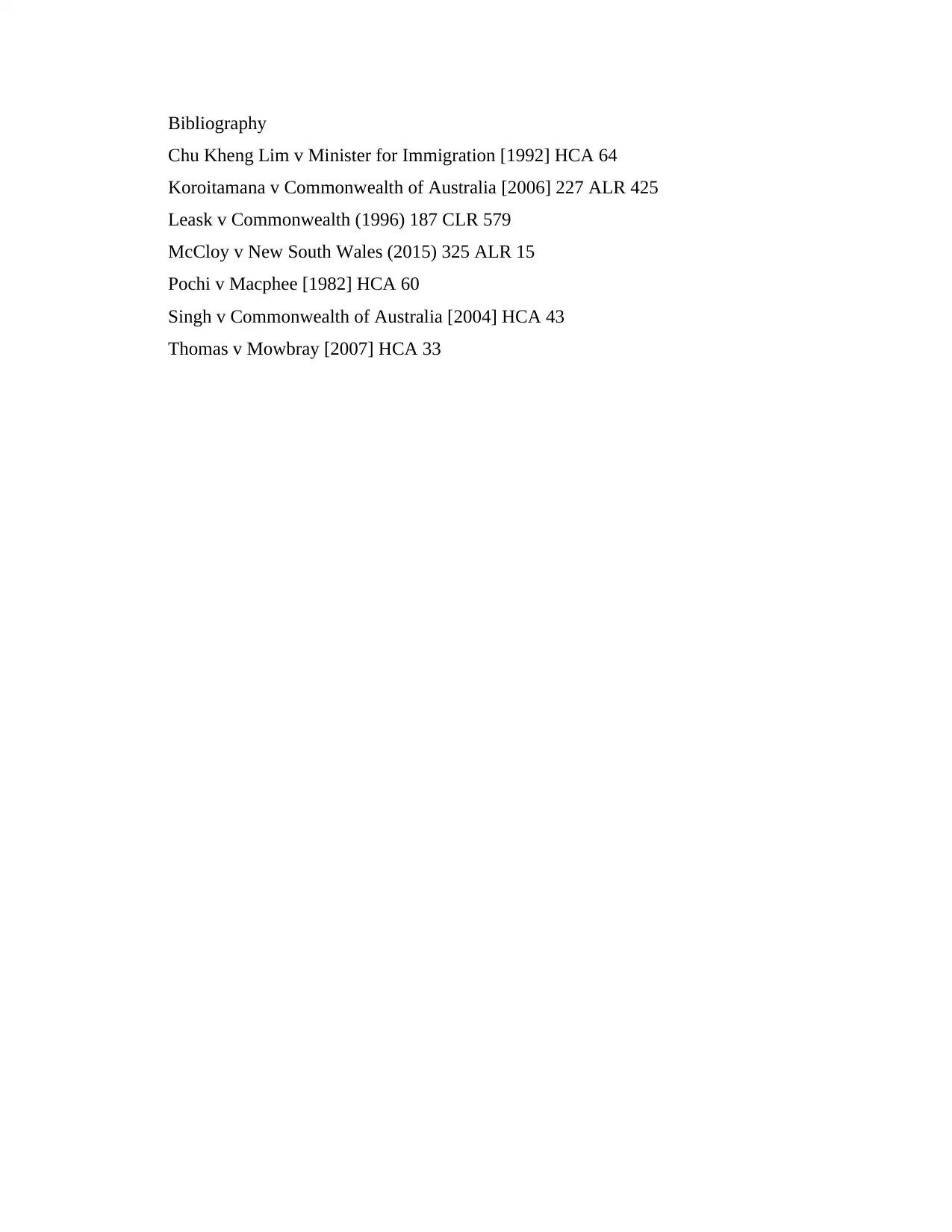
Bibliography
Chu Kheng Lim v Minister for Immigration [1992] HCA 64
Koroitamana v Commonwealth of Australia [2006] 227 ALR 425
Leask v Commonwealth (1996) 187 CLR 579
McCloy v New South Wales (2015) 325 ALR 15
Pochi v Macphee [1982] HCA 60
Singh v Commonwealth of Australia [2004] HCA 43
Thomas v Mowbray [2007] HCA 33
Chu Kheng Lim v Minister for Immigration [1992] HCA 64
Koroitamana v Commonwealth of Australia [2006] 227 ALR 425
Leask v Commonwealth (1996) 187 CLR 579
McCloy v New South Wales (2015) 325 ALR 15
Pochi v Macphee [1982] HCA 60
Singh v Commonwealth of Australia [2004] HCA 43
Thomas v Mowbray [2007] HCA 33
⊘ This is a preview!⊘
Do you want full access?
Subscribe today to unlock all pages.

Trusted by 1+ million students worldwide
1 out of 6
Related Documents
Your All-in-One AI-Powered Toolkit for Academic Success.
+13062052269
info@desklib.com
Available 24*7 on WhatsApp / Email
![[object Object]](/_next/static/media/star-bottom.7253800d.svg)
Unlock your academic potential
Copyright © 2020–2025 A2Z Services. All Rights Reserved. Developed and managed by ZUCOL.





